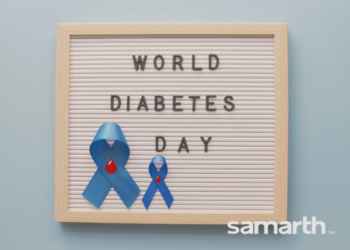Chronic diseases are the leading cause of death and disability worldwide. Unfortunately, in today’s time and age, our lifestyle, family genetics, and the overall environment around us make it nearly impossible for seniors and older adults to avoid contracting a chronic condition. According to the Centers for Disease Control and Prevention, about 85% of older adults have at least one chronic health condition, and 60% have at least two chronic conditions. In your own family, you probably have a parent or grandparent who is suffering from a chronic condition, or perhaps you are managing one yourself. Moreover, as we age, the risk of most chronic conditions increases, making seniors especially vulnerable.
Despite these grim details, older adults looking to boost their well-being and quality of life can do so by making simple lifestyle changes and adopting a few healthy habits. Here is a quick guide to help you slow, prevent and manage some of the most common chronic conditions.
Hypertension

Join Now >
Hypertension or high blood pressure is a common but serious condition in which your blood flows through your arteries at a higher pressure than normal. This damages blood vessels and can increase the risk of serious conditions like stroke, kidney failure and heart attack.
Hypertension is also known as the “silent killer” because it has no symptoms. You can prevent or manage high blood pressure by:
- Maintaining a healthy weight
- Regulating stress levels
- Reducing salt and alcohol intake
- Exercising regularly
- Monitoring blood pressure regularly
High Cholesterol
Your body needs cholesterol to build healthy cells, but high levels of it can lead to blockage in your blood vessels. This prevents blood flow through your arteries which can sometimes result in a heart attack or stroke.
You can prevent or manage high cholesterol by:
- Quitting smoking
- Reducing alcohol intake
- Exercising regularly
- Maintaining a healthy weight
- Reducing saturated and trans fats intake
- Regular cholesterol screenings
Diabetes
Your body needs the energy to perform its everyday functions, and insulin is what helps the body derive energy from food, and distributes it to your cells. Diabetes occurs when your body is resistant to or doesn’t produce enough insulin. This results in high levels of glucose in the blood, which can result in serious health problems, especially for seniors.
Over time, high blood sugar can cause damage to the kidneys, eyes, heart, teeth, nerves, and blood vessels. People over the age of 40-45 are more at risk of developing Diabetes. As an older adult, you can prevent or manage Diabetes by:
- Eating a healthy diet
- Exercising regularly
- Checking your blood sugar levels regularly
- Reducing your alcohol consumption
- Maintaining a healthy BMI
Chronic Kidney Disease
Chronic kidney disease or CKD involves a gradual decline in kidney function over time. Seniors with CKD have an increased risk of developing heart disease or kidney failure. You can manage or reduce the risk of developing CKD by:
- Eating a balanced diet
- Exercising regularly
- Limiting alcohol intake
- Getting tested regularly for diabetes and hypertension
- Frequent screenings for early detection and treatment
Coronary Heart Disease
Coronary heart disease is caused when plaque builds up in the arteries, reducing the amount of blood flow to the heart. This can cause complications such as blood clots, angina, or heart attack. You can prevent or manage coronary heart disease by:
- Regulating stress levels
- Exercising regularly
- Eating a balanced diet
- Limiting trans fats, sugar, and salt intake
- Maintaining a healthy BMI
- Quitting smoking
- Regular screenings for high cholesterol and hypertension
Chronic Obstructive Pulmonary Disease (COPD)
COPD is a disease that includes emphysema and chronic bronchitis. This makes breathing difficult, leading to shortness of breath. chess tightness and a persistent cough. Tips to prevent or manage COPD include”
- Quitting smoking, avoiding fine dust particles, chemical fumes and second-hand smoke.
- Taking prescribed medications
- Maintaining an active lifestyle
Arthritis
As we grow older, our joints start to hurt and we experience pain and stiffness in different parts of our bodies. While some of us do not admit it, this signals the onset of Arthritis. You can delay the onset of arthritis or manage symptoms by:
- Exercising regularly and staying active
- Maintaining a healthy weight
- Quitting smoking
- Regulating your blood sugar levels
- Protecting your joints from injury
Alzheimer’s disease and dementia
Alzheimer’s disease is a progressive chronic condition and is one the most common forms of dementia. As the disease progress, one may experience a loss of memory and other cognitive abilities that interfere with your quality of life.
While some of the biggest risk factors are out of your control, such as family history and genetics, a few lifestyle changes can help reduce your risk of developing Alzheimer’s disease. You can lower your risk of developing Alzheimer’s and other forms of dementia by:
- Staying mentally and socially active
- Eating healthy
- Exercising regularly
- Getting a good night’s sleep











